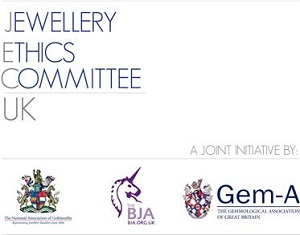Jewellery Ethics Committee UK Welcomes Govt Initiative
June 28, 14
 |
Later this year, the BRC will work with its members and key stakeholders to produce a publication highlighting good practice and recommendations for companies on ethical accreditation and auditing. "The jewelry industry has been making significant progress in improving ethical practice over the past 10 years, particularly in the gold supply chain," the JEC said in a statement.
"In regards to large scale mining, the World Gold Council has produced a Conflict Free standard for mines, whilst other measures to prevent the sale of gold from financing conflict have been created for refiners and smelters of gold, covering gold which is used to produce jewelry and electronics.
"Similarly, for diamonds, The Kimberly Process was designed to eradicate the financing of conflict through rough diamond sales. However, conflict is only one part of the problem for jewelers. Human rights abuses such as slave labor, child labor and issues associated with poverty are still prevalent in some sectors of the industry. Some of the most vulnerable people in the supply chain work in the small mines of developing countries and in the workshops which polish diamonds and gems or manufacture jewelry.
"The introduction of some initiatives, such as Fairtrade and Fairmined Gold in 2011 have truly transformed the way in which the industry can access gold from small scale miners, who, under both schemes, benefit from a fair pricing structure guaranteed at minimum of 95 percent of LBMA fix price, with an additional premium on every gram of gold sold. The premium is then invested by the miners into community development. To date, two mining communities in Peru have benefited from local gold mines becoming Fairtrade certified, with premiums being used to improve health care and education. Two more are on track for certification in Bolivia and Peru later this year whilst policy work continues with small scale miners on child labour and mercury eradication in other sites in South America. Nine pilot sites have been identified in East Africa, impacting over 3000 miners and their communities."
Greg Valerio, of Fairtrade International describes the key benefits of the Fairtrade system: “Fairtrade Gold offers the UK jewelry trade a verifiable and trusted way of improving ethical performance. It is the country’s only consumer certification stamp for gold and gives the consumer a guarantee that what they are buying can be traced to a certified Fairtrade mining group”
Over the past five years, the JEC-UK, a joint venture between the three major trade associations for the UK jewelry trade: the National Association of Goldsmiths (NAG) the British Jewellers’ Association (BJA); and the Gemmological Association of Great Britain (Gem-A), has been working with companies like Fairtrade International to ensure UK retailers are aware of the issues within their own supply chains and have practical advice on how to resolve these issues, the JEC said.
"JEC-UK has worked with jewelers, manufacturers and producers in the UK to provide 10 recommendations to improve transparency in the gold supply chain. As they are now working on a similar Diamond Paper for publication in 2014, news of the Business Minister’s announcement and the BRC’s subsequent report has been widely welcomed by all parties involved in the initiative."
Simon Rainer, CEO of BJA, said: “I am extremely pleased that BRC and HMG have chosen to highlight the issues prevalent in retail supply chains. I am even more pleased that the BJA, NAG and Gem-A recognized these issues several years ago and have been working earnestly, with all stakeholders, to create and effect change for the betterment of the UK jewelry industry."
Michael Rawlinson, CEO of the National Association of Goldsmiths, said: “Retailers should be in a position to answer consumers questions regarding the source of their jewelry and the industry has been working for several years on initiatives that will enable greater transparency. We will be delighted to help the BRC in producing their report with information relating to initiatives in the jewelry industry.”
James Riley, CEO of Gem-A, commented: "This is great news and reinforces the stance of JEC-UK. It shows exactly why the three associations are working so closely together on these issues - so that we can assist our members in running ever more responsible businesses. At Gem-A, we are currently working in partnership with The World Jewellery Confederation (CIBJO) and The World Jewellery Confederation Education Foundation (WJCEF) on a chain of custody solution which is accessible to SMEs and will help them tackle many of these issues."
Chairman of JEC-UK, Vivien Johnston, said: “We’ve been developing a series of steps for each sector of the industry to apply to their supply chains. Ultimately, we see the need for a credible assurance system for small businesses to demonstrate their ethical behavior. We also want to make consumers aware of the commitments companies have undertaken to eradicate human rights abuses, so they are in the position to make an informed choice about the ethical provenance of the jewelry they purchase.”